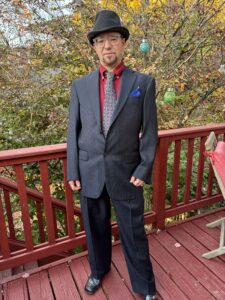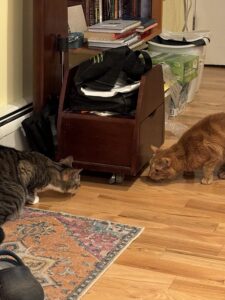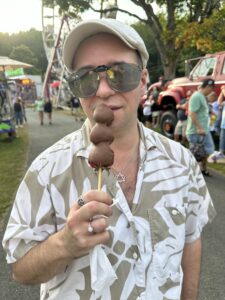Well, well. America woke up and chose fascism. Again.
The day after the election, I wrote a lot, because fury is a great creative motivator for me. In the following days, I had unwise quantities of boba tea in order to fuel myself with pleasure. I bought a new hat that is not as good as my old hat, which I lost in a taxi in NYC on my way home from a nude gay spiritual retreat last month. I cried when I needed to cry, and fought the twin temptations of denial and anxious proliferation of strategies.
Abuse, dysphoria, and the pandemic taught me something about staying present in a crisis I can’t control. I’ve learned not to talk myself out of the future I want, even when it seems impossible. Yes, it is going to be that bad, and no, I don’t know what to do about it, except keep being queer and making art until it’s really obvious that someone will kill me for it (and maybe even then). That’s my version of not obeying tyranny in advance.

At least I will die as the hottest version of myself.
I’m rereading Stephen Dobyns’ 1996 poetry collection Common Carnage, a stoic yet compassionate book about finding beauty in a cruel world. My favorite poem in this book, not available online as far as I can tell, is “Indifference to Consequence”, in which the speaker contrasts the resilient peacefulness of wildflowers in a sidewalk crack with the bloody, miserly competitiveness more typical of human nature. An excerpt:
…What does it mean to be joyous,
to transform one’s frailty into flower?
But even that judgment must be wrong.
To you the image of weakness is a wolf
offering its neck to the pack. Such
sacrifice is beyond your comprehension.Effortlessly these flowers bear the gifts
that remain to you a mystery. Think
of the boots that will crush them here,
trash cans and car tires yanked over the curb.
Even in life their death couldn’t scare them.
A poem I wrote last year, “These Characters and Themes Cannot Exist”, takes its title from a memo from a Charlotte County, FL education official directing schools to remove all books with LGBTQ content. It’s found a home at The Garlic Press, Issue #3. An excerpt:
…Emily is Nobody
and Abe never shared
his bearded honesty with Speed
in his bed.Don’t snap
your fingers, butterfly
boy bestie, your whispering sisters
will have to get alongwithout
your paper to copy
the unspeakable thing
Claggart was willing
to die to say to Billy.
…
At Electric Literature, Bareerah Ghani interviewed Palestinian poet Mosab Abu Toha, who has emerged as a leading voice of artistic resistance to Israeli occupation. Knopf published his second collection, Forest of Noise, last month.
When I write poetry, I’m not trying to humanize Palestinians. I’m an artist. This is how I perceive things. I see details. When I write about the people I love, or the people I see and care about, my students, my neighbors, my house, the garden in our house, the sunset, the clouds, the birds, I don’t see the frame of the picture. I see the picture itself. I’m not trying to humanize Palestinians, so that people in the outside world would say, Oh, you know these people are really kind, oh they deserve to be alive. No, this is another function of the poem. I, as an artist, care about the details of everyone’s life. Not because I’m Palestinian, and I want to humanize my people. But this is the way life is. When there is an airstrike, I don’t see the victim. I don’t see the baby who was beheaded by the Israel airstrike.
I see the pacifier, I see the cot, I see the blanket. It’s visible there as much as the baby is visible. These details indicate that there used to be a life before death happened. I see the full picture. I don’t only see what happened after the airstrike. I also see what was happening before that, which is equally important.
Torrey House Press, a literary publisher with an interest in the cultures and environmental issues of the American West, has revived its blog series “That Thing With Feathers: Hope & Literature in a Time of Upheaval”, which was launched in 2020-21 during the pandemic. Their goal is to publish nature writing that is spiritually replenishing and reminds us to fight alongside our allies in the nonhuman world. In a recent installment, Laura Pritchett shares this advice from Roman emperor and Stoic philosopher Marcus Aurelius:
“Whatever anyone does or says, for my part I’m bound to the good,” Marcus Aurelius writes in Meditations. “In the same way an emerald or gold or purple might always proclaim: ‘whatever anyone does or says, I must be what I am and show my true colors.’” Whatever happens in life, in world events, in politics, our job is our job, our duty is our duty. How does this stop you, Marcus asks elsewhere in Meditations, from acting with courage, discipline, justice and wisdom? In fact, it may well be that these election results present you with an incredible—and urgent and critical—opportunity to act with virtue.
In case you missed it, this post-election pep talk from Rachel Maddow is good for reviving your fighting spirit (12-minute video).
Boundary-setting queen Captain Awkward is on fire in her latest post about your right to distance yourself from Trump-voting relatives.
…The longer you stay invested in trying to extract accountability or persuade the un-persuadable, the more you expose yourself to people who hurt you. So, do you want to win the argument, or do you want to be free?
You can have space and peace and healing, with time.
You can re-invest all the effort and resources that you spent on them into building community with people who don’t make you feel this bad.
You can have the last word, sort of, in that you can say your piece and then stop responding to whatever they say back.
You can try to maintain a strictly superficial relationship that requires the least possible amount of effort and engagement from you. (Often useful or necessary when the problem person is the gatekeeper to relationships with other family members, like children).
But no matter how hard you try, you can’t fix other people’s hearts for them. These bogus calls for “unity” and “not letting politics distract us from what’s really important” are the same trap they’ve always been: “I get to treat you like shit, and you have to love and forgive me forever no matter how I treat you, and if you ever decide to stop playing this terrible game, I get to play the victim and blame everything on your supposed lack of empathy and commitment. Who wants a hug?”
Le sigh. Patriarchy is nothing if not boringly consistent, and you’ll notice that these articles about “how to coexist peacefully at holidays despite contrasting politics” are always about the concessions and compassion we owe them, and never about the basic human fucking decency they owe us. Continuously debating your own humanity with abusive people is a fruitless project that maintains the illusion that your safety and happiness are something they grant you, and not something that has always been yours. Sometimes all you can do is divest, disengage, and go somewhere safe to lick your wounds and rebuild a life that doesn’t revolve around them.
Finally, I enthusiastically recommend the website Waging Nonviolence for resistance ideas that don’t depend on naïve trust in our institutions, but don’t wholly destroy them either. Daniel Hunter’s article “10 ways to be prepared and grounded now that Trump has won” encourages us to work on our mental health, avoid despair and isolation, give mutual aid, and remember they can’t execute their plans unless ordinary people cooperate…so what if we just don’t?
Distrust fuels the flame of autocracy because it makes it much easier to divide…
This is a social disease: You know who to trust by who they tell you to distrust.
Trust-building starts with your own self. It includes trusting your own eyes and gut, as well as building protection from the ways the crazy-making can become internalized.
This also means being trustworthy — not just with information, but with emotions. That way you can acknowledge what you know and admit the parts that are uncertain fears nagging at you.
***
We’re not going to convince him not to do these things. No pressure on Republicans will result in more than the tiniest of crumbs (at least initially). We’re not going to stop him from doing these things just by persuasive tactics or showing that there are a LOT of us who oppose them.
It will be helpful to have a power analysis in our minds, specifically that’s known as the upside-down triangle. This tool was built to explain how power moves even under dictatorships.
The central tenet is that like an upside-down triangle, power can be unstable. It naturally topples over without anything supporting it. To prevent that, power relies on pillars of support to keep it upright.
Casually, the left often focuses on pillars of support that include governments, media, corporations, shareholders and policy makers. Describing the pillars of support, Gene Sharp wrote:“By themselves, rulers cannot collect taxes, enforce repressive laws and regulations, keep trains running on time, prepare national budgets, direct traffic, manage ports, print money, repair roads, keep markets supplied with food, make steel, build rockets, train the police and army, issue postage stamps or even milk a cow. People provide these services to the ruler though a variety of organizations and institutions. If people would stop providing these skills, the ruler could not rule.”
Removing one pillar of support can often gain major, life-saving concessions. In response to Trump’s 2019 government shutdown, flight attendants prepared a national strike. Such a strike would ground planes across the country and a key transportation network. Within hours of announcing they were “mobilizing immediately” for a strike, Trump capitulated.
“Our grief can help direct us toward what is ours to tend”: check out this 5-minute meditation on post-election grief from the spiritual wellness site Wild Heart.






